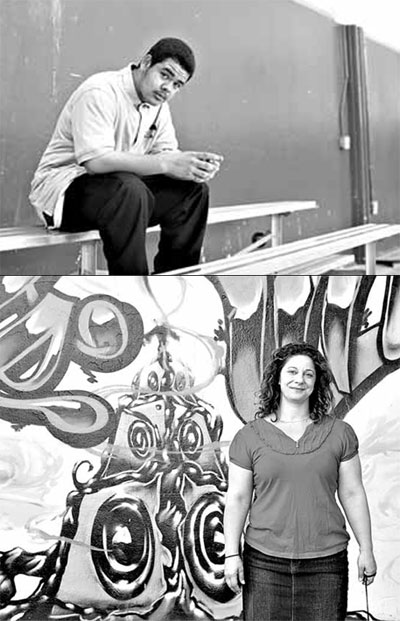In the digital era, a divide over wasting time
Updated: 2012-06-10 08:02
By Matt Richtel(The New York Times)
|
|||||||
|
Most children use devices for entertainment rather than educational purposes. Technology at home is "not a savior," said Laura Robell, a middle-school principal in a low-income area of Oakland, California. Top, Alejandro Zamora, an eighth grader, calls himself "a Facebook freak." Drew Kelly for The New York Times |
In the 1990s, the term "digital divide" emerged to describe technology's haves and have-nots. It inspired efforts to get the latest computing tools into the hands of all Americans, particularly low-income families.
And those efforts have shrunk the divide. But they have created an unintended side effect, one that is troubling to researchers and policy makers and that the government now wants to fix.
As access to devices has spread, children in poorer families are spending considerably more time than children from more well-off families using their televisions and gadgets to watch shows and videos, play games and connect on social networking sites, studies show.
This growing time-wasting gap, policy makers and researchers say, is more a reflection of the ability of parents to monitor how children use technology than of access to it.
"I'm not antitechnology at home, but it's not a savior," said Laura Robell, the principal at Elmhurst Community Prep, a public middle school in the lower-income area of East Oakland, California, who has long doubted the value of putting a computer in every home without proper oversight. "So often we have parents come up to us and say, 'I have no idea how to monitor Facebook.'"
The new divide is such a cause of concern for the Federal Communications Commission that it is considering a proposal to spend $200 million to create a digital literacy corps. This group of hundreds, even thousands, of trainers would fan out to schools and libraries to teach productive uses of computers to parents, students and job seekers.
These efforts complement a handful of private and state projects aimed at paying for digital trainers to teach everything from keyboard use and word processing to how to apply for jobs online or use filters to block children from seeing pornography.
"Digital literacy is so important," said Julius Genachowski, chairman of the commission, adding that bridging the digital divide means "giving parents and students the tools and know-how to use technology for education and job-skills training."
F.C.C. officials and other policy makers say they still want to get computing devices into the hands of every American.
According to the commission, about 65 percent of Americans have broadband access at home, but that figure is 40 percent in households with less than $20,000 in annual income. Half of all Hispanics and 41 percent of African-American homes lack broadband.
A study published in 2010 by the Kaiser Family Foundation, a group studying health policy in the United States, found that children and teenagers whose parents do not have a college degree spent 90 minutes more per day exposed to media than children from higher socioeconomic families. In 1999, the difference was just 16 minutes.
The study also found that children of parents who do not have a college degree spend 11.5 hours each day exposed to media, including television, computers and gadgets. That is an increase of 4 hours and 40 minutes per day since 1999.
Children of more educated parents, generally understood as a proxy for higher socioeconomic status, also largely use their devices for entertainment. In families in which a parent has a college education or an advanced degree, Kaiser found, children use 10 hours of multimedia a day, a 3.5-hour jump since 1999.
"Despite the educational potential of computers, the reality is that their use for education or meaningful content creation is minuscule compared to their use for pure entertainment," said Vicky Rideout, author of the Kaiser study. "Instead of closing the achievement gap, they're widening the time-wasting gap."
The concerns are brought to life in families like those of Markiy Cook, a thoughtful 12-year-old in Oakland. At home, where money is limited, his family has two laptops, an Xbox 360 and a Nintendo Wii, and he has his own phone. He uses them mostly for Facebook, YouTube, texting and games.
He particularly likes playing them on the weekends.
"I stay up all night, until like 7 in the morning," he said, laughing sheepishly. "It's why I'm so tired on Monday." His grades are suffering with a D average. He wants to be a biologist when he grows up, he said.
Alejandro Zamora, 13, an eighth grader, calls himself "a Facebook freak." His mother, Olivia Montesdeoca, said she liked the idea of him using the computer but did not have much luck getting him to use it for homework.
"He'd have a fit. He'd have a tantrum," she said, adding that she really did not understand some of what he did online. "I have no idea about YouTube. I've never even heard of a webcam."
The New York Times
(China Daily 06/10/2012 page12)
